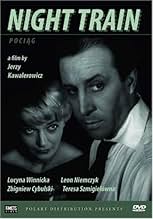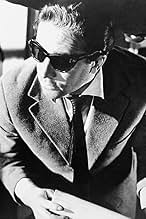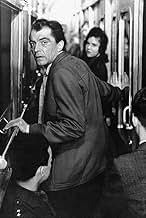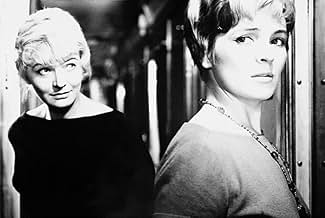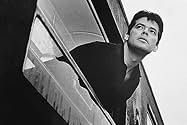Pociag
- 1959
- 1h 39m
ÉVALUATION IMDb
7,7/10
3,8 k
MA NOTE
Ajouter une intrigue dans votre langueJerzy enters a train set for the Baltic coast. He seems to be on the run from something, as does the strange woman with whom he must share a sleeping compartment.Jerzy enters a train set for the Baltic coast. He seems to be on the run from something, as does the strange woman with whom he must share a sleeping compartment.Jerzy enters a train set for the Baltic coast. He seems to be on the run from something, as does the strange woman with whom he must share a sleeping compartment.
- Prix
- 2 victoires et 1 nomination au total
Andrzej Herder
- Sailor
- (uncredited)
Barbara Horawianka
- Jerzy's Wife
- (uncredited)
Histoire
Le saviez-vous
- ConnexionsFeatured in Fejezetek a film történetéböl: A lengyel film (1990)
Commentaire en vedette
A bird's-eye view of a crowded train station. A haunting, almost chilling jazz score with sensuous female vocals. Crisp black and white cinematography. You can't help but get the feel of a high quality noir film right from the first frame. The myriad human beings look like small creatures scurrying in all directions. It's a seemingly normal view at a train station. Soon, as the view draws closer, we get a glimpse of some of the primary players in this strangely ambiguous psychological drama.
A dapper looking man with sunglasses, Jerzy (Leon Niemczyk) enters the train compartment without a ticket (saying that he forgot everything at home) and insists on buying his way into the train, and also the neighbouring berths 'cause he wants to alone. He seems to be tensed, possibly just wants to go away some place, hardly smiles, and smokes a lot of cigarettes. A beautiful young blonde, Marta (Lucyna Winnicka) makes an appearance. She has a certain sadness in her eyes. She obviously has something to hide and is probably on the run from something. A younger man (Zbigniew Cybulski), hot on her pursuit, enters ticket-less and proceeds to constantly stalk her, every chance he gets. As luck would have it, some sort of technical error leads to Marta and Jerzy ending up in the same coupe of two berths. Both of them are visibly disconcerted by this, but eventually give in, and are forced to spend the night in the company of each other, owing to lack of any other option.
It's the holidays and the train is practically overflowing, as passengers crowd the corridors. They are a motley crew of individuals with varied behavioral traits and their own quirks. There are a group of ogling men who lustfully eye practically every woman that passes by. There's a flirtatious, married woman (Teresa Szmigielówna) trying to seek the attention of Jerzy every chance she gets, even at the momentary halts at the intermediate stations. For a while we can only hear her husband's voice, who seems to be a lawyer, and for some reason, seems to be a very boring companion! There's a young sailor who quietly stares in admiration at a pretty young thing, throughout the train journey. And then there's an man, an insomniac who cannot sleep in the bunk beds because they remind him of his concentration camp days, so he spends his time reading in the corridor.
Amidst all the chaos, there is some gossip about the latest news of a man who killed his wife and fled! A lot of conversations, exchanges of glances, vague ramblings later, the journey turns into an eventful one for all the passengers. The train suddenly stops at an unknown location, where official authorities board the train, for they have information that there is a wanted killer on board! Which of these ensemble of characters is the person they are looking for? There are suddenly grapevines, as doubt and tension fill the environment, and the characters we are by now familiar with, begin to exhibit a gradual transformation of sorts .
Jerzy Kawalerowicz's "Night Train" (Original title: Pociag) is not much about its plot. It is, in fact, a very realistic study of how a given group of people would behave and make judgments based on whatever little information they have. Passengers on a train are mostly strangers to each other. But a lot is judged (or misjudged) based on their overall demeanor, body language, personality, and what-not. It is a strikingly natural aspect of any human being and "Night Train" brings it out like no other! The lead characters are both strangers to each other, and in that one night together, they seem to assume quite a few things about each other. So do the other passengers. Where the director plays a winning hand, is at his tactful handling of the screenplay by keeping things deliberately ambiguous for the most part, playing a clever trick on the audience, by keeping them guessing constantly, as they start framing their initial mental perceptions about the various characters. The viewer, then, becomes a passenger himself, the kind of curious bystander who makes enquiries in hushed whispers, despite knowing that its none of his/her business. Or the kind that pushes the others aside to be amongst the first to know more and gossip about it; or the kind of person who starts judging based on initial impressions.
So what is the reality of all these characters then? We are given a hint of it much later, although not everything is declared explicitly. Kawalerowicz's ploy lies in keeping almost everything under wraps until the final half hour when some subtle twists almost sharpen the blurs, but not entirely! It is also during this time that we learn how a society as a whole, goes up in arms, against anything deemed wrong in the conventional sense. Somewhere amidst all the chaos, we, as individuals of society are also shown the mirror. It is alarming how people can turn their backs on you and stop at nothing to malign or blacklist you, just as quickly as they can turn you into a hero! Kawalerowicz's film has some extraordinary camera-work (apparently most of the train corridor scenes were shot on a set; it is almost impossible to make out), which has its highly realistic effect on the viewer (the suffocating feeling of trying to squeeze through a narrow, crowded passageway). It also has some great performances, especially by the two leads, Leon Niemczyk and Lucyna Winnicka, and there's some riveting drama and mesmerizing score to go along. But "Night Train" goes way beyond its very enticing exterior of a claustrophobic, tense noir, a supposed nod to Hitchcock's thrillers. It makes a very important statement on societal dynamics.
A hidden gem, a winner all the way!
A dapper looking man with sunglasses, Jerzy (Leon Niemczyk) enters the train compartment without a ticket (saying that he forgot everything at home) and insists on buying his way into the train, and also the neighbouring berths 'cause he wants to alone. He seems to be tensed, possibly just wants to go away some place, hardly smiles, and smokes a lot of cigarettes. A beautiful young blonde, Marta (Lucyna Winnicka) makes an appearance. She has a certain sadness in her eyes. She obviously has something to hide and is probably on the run from something. A younger man (Zbigniew Cybulski), hot on her pursuit, enters ticket-less and proceeds to constantly stalk her, every chance he gets. As luck would have it, some sort of technical error leads to Marta and Jerzy ending up in the same coupe of two berths. Both of them are visibly disconcerted by this, but eventually give in, and are forced to spend the night in the company of each other, owing to lack of any other option.
It's the holidays and the train is practically overflowing, as passengers crowd the corridors. They are a motley crew of individuals with varied behavioral traits and their own quirks. There are a group of ogling men who lustfully eye practically every woman that passes by. There's a flirtatious, married woman (Teresa Szmigielówna) trying to seek the attention of Jerzy every chance she gets, even at the momentary halts at the intermediate stations. For a while we can only hear her husband's voice, who seems to be a lawyer, and for some reason, seems to be a very boring companion! There's a young sailor who quietly stares in admiration at a pretty young thing, throughout the train journey. And then there's an man, an insomniac who cannot sleep in the bunk beds because they remind him of his concentration camp days, so he spends his time reading in the corridor.
Amidst all the chaos, there is some gossip about the latest news of a man who killed his wife and fled! A lot of conversations, exchanges of glances, vague ramblings later, the journey turns into an eventful one for all the passengers. The train suddenly stops at an unknown location, where official authorities board the train, for they have information that there is a wanted killer on board! Which of these ensemble of characters is the person they are looking for? There are suddenly grapevines, as doubt and tension fill the environment, and the characters we are by now familiar with, begin to exhibit a gradual transformation of sorts .
Jerzy Kawalerowicz's "Night Train" (Original title: Pociag) is not much about its plot. It is, in fact, a very realistic study of how a given group of people would behave and make judgments based on whatever little information they have. Passengers on a train are mostly strangers to each other. But a lot is judged (or misjudged) based on their overall demeanor, body language, personality, and what-not. It is a strikingly natural aspect of any human being and "Night Train" brings it out like no other! The lead characters are both strangers to each other, and in that one night together, they seem to assume quite a few things about each other. So do the other passengers. Where the director plays a winning hand, is at his tactful handling of the screenplay by keeping things deliberately ambiguous for the most part, playing a clever trick on the audience, by keeping them guessing constantly, as they start framing their initial mental perceptions about the various characters. The viewer, then, becomes a passenger himself, the kind of curious bystander who makes enquiries in hushed whispers, despite knowing that its none of his/her business. Or the kind that pushes the others aside to be amongst the first to know more and gossip about it; or the kind of person who starts judging based on initial impressions.
So what is the reality of all these characters then? We are given a hint of it much later, although not everything is declared explicitly. Kawalerowicz's ploy lies in keeping almost everything under wraps until the final half hour when some subtle twists almost sharpen the blurs, but not entirely! It is also during this time that we learn how a society as a whole, goes up in arms, against anything deemed wrong in the conventional sense. Somewhere amidst all the chaos, we, as individuals of society are also shown the mirror. It is alarming how people can turn their backs on you and stop at nothing to malign or blacklist you, just as quickly as they can turn you into a hero! Kawalerowicz's film has some extraordinary camera-work (apparently most of the train corridor scenes were shot on a set; it is almost impossible to make out), which has its highly realistic effect on the viewer (the suffocating feeling of trying to squeeze through a narrow, crowded passageway). It also has some great performances, especially by the two leads, Leon Niemczyk and Lucyna Winnicka, and there's some riveting drama and mesmerizing score to go along. But "Night Train" goes way beyond its very enticing exterior of a claustrophobic, tense noir, a supposed nod to Hitchcock's thrillers. It makes a very important statement on societal dynamics.
A hidden gem, a winner all the way!
- Aditya_Gokhale
- 28 oct. 2012
- Lien permanent
Meilleurs choix
Connectez-vous pour évaluer et surveiller les recommandations personnalisées
- How long is Night Train?Propulsé par Alexa
Détails
- Durée1 heure 39 minutes
- Couleur
- Mixage
- Rapport de forme
- 1.37 : 1
Contribuer à cette page
Suggérer une modification ou ajouter du contenu manquant


